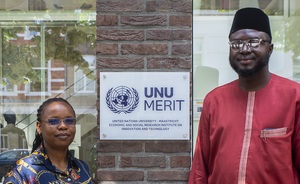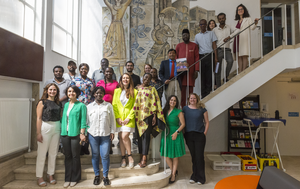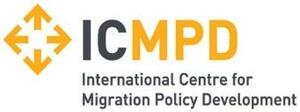Participants share their key takeaways from UNU-MERIT’s Migration Management Diploma Programme
The Migration Management Diploma Programme (MMDP) is a capacity development programme which has been offered by UNU-MERIT since 2013. This programme is designed for government officials working in migration and asylum. Running for three months full-time, the course uses various teaching and evaluation methods, including lectures and interactive sessions with participants.
We interviewed two MMDP participants in the 2023 cohort, Mr. Musa Camara (Director Diaspora and Migration, the Gambia) and Ms. Joan Mumbua Mutua (Senior Immigration Officer, Kenya). [Below, their names are abbreviated as M.C. and J.M.M. respectively.]
What inspired you to apply to the MMDP programme?
J.M.M.: As an immigration officer, I always feel I need to gain more knowledge on migration issues. I remember there was a time I was talking to my colleague, and he happened to remember my colleagues who had done the Migration Management Diploma Programme (MMDP) and told me that I should look it up as it fitted what I was looking for. With that, I found that it has courses that focus mainly on migration issues, and thus I applied for the programme.
M.C.: Following my redeployment as director of the newly established Diaspora and Migration Directorate at the Ministry of Foreign Affairs, International Cooperation and Gambians Abroad, I felt the need to pursue a specialized training course in migration management. Learning about the MMDP from a friend working with the EU Delegation in The Gambia was exciting and a dream come true for me.
The course content of the MMDP perfectly matches with my new responsibilities. I was very keen on the fact that the program would equip me with the academic perspective on migration management – and specifically diaspora engagement. I naturally felt that the MMDP was the right program to improve the expertise, competence and confidence I needed to efficiently discharge my functions.
As co-chair of the National Coordination Mechanism for Migration and National Focal Person to the Rabat Process, I knew undoubtedly that the MMDP would strengthen and enhance my accrued experience in migration management to become more responsive and future-ready, considering migration is becoming a key priority for my government.
You have now completed the first two modules of the programme, with one module left. Can you share with us some of your programme highlights so far?
J.M.M.: The program course context is well thought-out, and learning directly from migration scholars and professors that you have already heard or read about is a bonus. The balance created between course work, assignments, group discussions and also study days enabled me to be flexible, participate and gain knowledge relevant to my job without feeling stressed out.
Having different people with different cultures and backgrounds enabled me to share on different scenarios about migration-related issues. I also gained knowledge on best practices being used by different countries through class and group discussions.
The field trips [participants travel to The Hague, Geneva and Brussels to gain knowledge from national, international and regional actors working on migration] have been the best experience. I was able to observe and relate to how institutions work coherently whether internationally, nationally or regionally so as to provide the needed support in issues regarding migration. Visiting the headquarters of international organizations in Geneva provided an insight on their mandates.
M.C.: The outcomes of the MMDP have exceeded my expectations. The competence and expertise of the faculty as well as the delivery of the modules, environment and organization are all excellent. The programme is practical and hands-on. In one word, I would describe the MMDP as “fulfilling.”
The programme enabled me to access various data sources and analyze my country’s national migration profile using the latest data (as of 2022) for policy guidance. It also equipped me with the requisite skills to access and analyze migration data for understanding the dynamics, trends and patterns of migration. The International Migration Law module in particular exposed me to various conventions and treaties that are fundamental to my work as a policymaker and practitioner in the protection of migrants’ rights.
MMDP participants are governmental officials working on migration and asylum matters. What are you planning to bring back to your department and home country with the knowledge and tools acquired?
J.M.M.: I know that my experience will really help the training and research sections in my department, as we can now add many more materials to our training modules. The knowledge I have gained will also help my department coordinate trainings with other relevant departments, such as those of labour and foreign affairs. In addition to colleagues learning from what I have learned, I expect collaboration across institutions to increase, in turn benefiting governments in both origin and destination countries – and most importantly, the migrants.
M.C.: Upon return, I will organize staff trainings for my directorate, the migration focal persons in our embassies, staff of the foreign ministry, the National Coordination Mechanism for Migration (NCM) and members of the technical working groups dealing with various thematic areas of migration. In fact, my colleagues have already asked that I organize these trainings. I work a lot on return, readmission and reintegration of migrants and facilitate an interface between the Government and The Gambian Diaspora, and I envisage a more proactive, efficient and effective delivery of my services.
I will optimally put to use the knowledge and skills acquired from the MMDP by giving evidence-based guidance to my Government, including advocating for the mainstreaming of migration into various sectoral policies.
The MMDP programme brings in together officials from different ministries and different countries. How did you benefit from having discussions and debates with such a diverse group?
J.M.M.: People from different cultures and places have a different way of viewing an issue, and this makes you learn to appreciate what everybody brings to the table. For example, I have learned that migration is influenced by country size – small countries have different ways of coping with migration as compared to big countries on the same level of development.
I have learned some of the best migration practices in different country contexts – and how government, civil society and other institutions are linked – that can be applied in my home country. With this, I am able to assess the gaps that exist in my home country.
M.C.: The diversity created by the MMDP Team is outstanding, profound, and enriching, and from this I have greatly benefitted. This diversity also made my stay in Maastricht more memorable and enjoyable – we became a big family.
I am grateful for such a composition that has contributed to polishing and refining me into a different person than I was on the first day of the MMDP.
ANY COMMENTS?
NOTA BENE
This document has been produced with the financial assistance of the European Union, contracted by ICMPD through the Migration Partnership Facility (MPF). The contents of this document are the sole responsibility of Maastricht University Graduate School of Governance, Maastricht University and can under no circumstances be regarded as reflecting the position of the European Union and the one of ICMPD.
MEDIA CREDITS
Photo: H. Pijpers / UNU-MERIT | Maastricht University and Sébastien Goldberg on Unsplash









